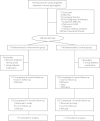The Live Well, Be Well study: a community-based, translational lifestyle program to lower diabetes risk factors in ethnic minority and lower-socioeconomic status adults
- PMID: 22698027
- PMCID: PMC3395772
- DOI: 10.2105/AJPH.2011.300456
The Live Well, Be Well study: a community-based, translational lifestyle program to lower diabetes risk factors in ethnic minority and lower-socioeconomic status adults
Abstract
Objectives: We evaluated a community-based, translational lifestyle program to reduce diabetes risk in lower-socioeconomic status (SES) and ethnic minority adults.
Methods: Through an academic-public health department partnership, community-dwelling adults at risk for diabetes were randomly assigned to individualized lifestyle counseling delivered primarily via telephone by health department counselors or a wait-list control group. Primary outcomes (6 and 12 months) were fasting glucose level, triglycerides, high- and low-density lipoprotein cholesterol, weight, waist circumference, and systolic blood pressure. Secondary outcomes included diet, physical activity, and health-related quality of life.
Results: Of the 230 participants, study retention was 92%. The 6-month group differences for weight and triglycerides were significant. The intervention group lost 2 pounds more than did the control group (P=.03) and had decreased triglyceride levels (difference in change, 23 mg/dL; P=.02). At 6 months, the intervention group consumed 7.7 fewer grams per day of fat (P=.05) and more fruits and vegetables (P=.02) than did control participants.
Conclusions: Despite challenges designing effective translational interventions for lower-SES and minority communities, this program modestly improved some diabetes risk factors. Thus, individualized, telephone-based models may be a promising alternative to group-based interventions.
Figures
References
-
- Centers for Disease Control and Prevention National Diabetes Fact Sheet: National Estimates and General Information on Diabetes and Prediabetes in the United States. Atlanta, GA: Centers for Disease Control and Prevention; 2011
-
- Vega WA, Amaro H. Latino outlook: good health, uncertain prognosis. Annu Rev Public Health. 1994;15:39–67 - PubMed
-
- Liao Y, Tucker P, Okoro CA, Giles WH, Mokdad AH, Harris VB. REACH 2010 Surveillance for Health Status in Minority Communities—United States, 2001–2002. MMWR Surveill Summ. 2004;53(6):1–36 - PubMed
-
- Carter JS, Pugh JA, Monterrosa A. Non-insulin-dependent diabetes mellitus in minorities in the United States. Ann Intern Med. 1996;125(3):221–232 - PubMed
-
- Harris MI, Flegal KM, Cowie CCet al.Prevalence of diabetes, impaired fasting glucose, and impaired glucose tolerance in U.S. adults: the Third National Health and Nutrition Examination Survey, 1988-1994. Diabetes Care. 1998;21(4):518–524 - PubMed


